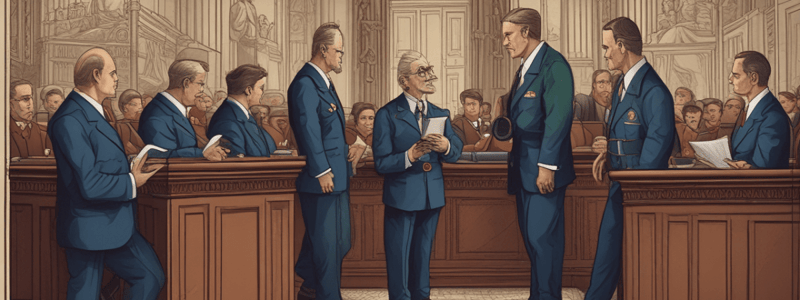Podcast
Questions and Answers
What is the overriding procedural requirement regarding the obtaining of admissions and confessions?
What is the overriding procedural requirement regarding the obtaining of admissions and confessions?
- Voluntariness (correct)
- Custody
- Interrogation
- Miranda Warning
What is the main purpose of a Miranda warning?
What is the main purpose of a Miranda warning?
- To inform the suspect of their right to remain silent (correct)
- To protect law enforcement from liability
- To inform the suspect of their right to an attorney
- To intimidate the suspect into confessing
Which Amendment to the U.S. Constitution is protected by the reading of the 'Miranda Rights'?
Which Amendment to the U.S. Constitution is protected by the reading of the 'Miranda Rights'?
- Fourth Amendment
- Sixth Amendment
- First Amendment
- Fifth Amendment (correct)
When is a Miranda warning typically required?
When is a Miranda warning typically required?
What is the 'Miranda Equation'?
What is the 'Miranda Equation'?
Who is the Miranda warning requirement typically applied to?
Who is the Miranda warning requirement typically applied to?
What is the effect of any custody issues on the need for Miranda warnings?
What is the effect of any custody issues on the need for Miranda warnings?
What is the best procedure to follow when listening to volunteered statements without giving a Miranda warning?
What is the best procedure to follow when listening to volunteered statements without giving a Miranda warning?
Who has the burden of proving that a Miranda warning was properly given?
Who has the burden of proving that a Miranda warning was properly given?
What must a suspect agree to before interrogation can begin?
What must a suspect agree to before interrogation can begin?
What is the effect of a suspect being under the influence of drugs or alcohol on the Miranda warning process?
What is the effect of a suspect being under the influence of drugs or alcohol on the Miranda warning process?
What should an officer do if a suspect refuses to sign a written waiver?
What should an officer do if a suspect refuses to sign a written waiver?
How long do Miranda protections last after a suspect invokes their rights?
How long do Miranda protections last after a suspect invokes their rights?
When is it a good idea to repeat a Miranda warning?
When is it a good idea to repeat a Miranda warning?
What is the overriding procedural requirement for obtaining admissions and confessions?
What is the overriding procedural requirement for obtaining admissions and confessions?
What happens to a suspect once the government initiates adversarial judicial proceedings against them?
What happens to a suspect once the government initiates adversarial judicial proceedings against them?
Can a defendant waive their rights after initially refusing to talk to the police?
Can a defendant waive their rights after initially refusing to talk to the police?
Can the police interrogate a defendant about unrelated crimes after they have invoked their rights?
Can the police interrogate a defendant about unrelated crimes after they have invoked their rights?
What was a common method of extracting confessions in the past?
What was a common method of extracting confessions in the past?
When did the English courts begin to consider the reliability of confessions?
When did the English courts begin to consider the reliability of confessions?
What was the significance of the Bram v. United States case in 1897?
What was the significance of the Bram v. United States case in 1897?
What was the outcome of the Brown v. Mississippi case in 1936?
What was the outcome of the Brown v. Mississippi case in 1936?
What was the issue in the Ashcroft v. Tennessee case in 1944?
What was the issue in the Ashcroft v. Tennessee case in 1944?
What was the outcome of the Leyra v. Denno case in 1954?
What was the outcome of the Leyra v. Denno case in 1954?
What was the issue in the Spano v. New York case in 1959?
What was the issue in the Spano v. New York case in 1959?
What was the outcome of the Townsend v. Sain case in 1963?
What was the outcome of the Townsend v. Sain case in 1963?
What was the issue with the voluntariness standard?
What was the issue with the voluntariness standard?
What led to the need for reform in police interrogation practices?
What led to the need for reform in police interrogation practices?
What determines whether a person is in custody for Miranda purposes?
What determines whether a person is in custody for Miranda purposes?
Which of the following behaviors by an officer can create the impression of custody?
Which of the following behaviors by an officer can create the impression of custody?
What is the significance of the number of officers present during an interview?
What is the significance of the number of officers present during an interview?
What is an important factor in determining whether an interview is custodial?
What is an important factor in determining whether an interview is custodial?
What is considered interrogation for Miranda purposes?
What is considered interrogation for Miranda purposes?
What is the officer's responsibility regarding the Miranda warning?
What is the officer's responsibility regarding the Miranda warning?
What is the purpose of the first part of the Miranda warning?
What is the purpose of the first part of the Miranda warning?
What is an example of a booking question?
What is an example of a booking question?
What happens if an officer extends the scope of a volunteered statement with questions?
What happens if an officer extends the scope of a volunteered statement with questions?
What is the significance of an officer's clear intent to encourage an incriminating statement?
What is the significance of an officer's clear intent to encourage an incriminating statement?
What is required before an attorney can be present during an interrogation?
What is required before an attorney can be present during an interrogation?
What should happen if a suspect refuses to sign a written waiver?
What should happen if a suspect refuses to sign a written waiver?
What is required for a waiver of rights to be valid?
What is required for a waiver of rights to be valid?
What should an officer do if they are unsure of a suspect's waiver?
What should an officer do if they are unsure of a suspect's waiver?
What happens if a suspect changes their mind during an interrogation?
What happens if a suspect changes their mind during an interrogation?
What is necessary for a waiver of Miranda rights to be considered valid?
What is necessary for a waiver of Miranda rights to be considered valid?
When must a Miranda warning be repeated?
When must a Miranda warning be repeated?
What is the effect of a suspect's ambiguous statement regarding their desire to continue or see an attorney?
What is the effect of a suspect's ambiguous statement regarding their desire to continue or see an attorney?
Who should supervise the Miranda warnings process for juveniles?
Who should supervise the Miranda warnings process for juveniles?
What is the requirement for interrogating a suspect about a different crime?
What is the requirement for interrogating a suspect about a different crime?
What should be done if a suspect claims to not understand their Miranda rights?
What should be done if a suspect claims to not understand their Miranda rights?
What is the effect of a suspect's request for an attorney?
What is the effect of a suspect's request for an attorney?
What should an officer do if a suspect requests a lawyer?
What should an officer do if a suspect requests a lawyer?
What is the ruling on the two-part interrogation technique?
What is the ruling on the two-part interrogation technique?
Can a person with apparent sub-standard intelligence be Mirandized and interrogated?
Can a person with apparent sub-standard intelligence be Mirandized and interrogated?
What should an officer do if a suspect is under the influence of drugs or alcohol?
What should an officer do if a suspect is under the influence of drugs or alcohol?
What happens if a suspect refuses to sign a written waiver?
What happens if a suspect refuses to sign a written waiver?
What was Ernesto Arturo Miranda arrested for in 1966?
What was Ernesto Arturo Miranda arrested for in 1966?
What is the primary purpose of the Miranda warning?
What is the primary purpose of the Miranda warning?
What should an officer do if a suspect invokes their Miranda rights?
What should an officer do if a suspect invokes their Miranda rights?
Can a suspect waive their Miranda rights after initially refusing to talk to the police?
Can a suspect waive their Miranda rights after initially refusing to talk to the police?
When does the Sixth Amendment right to an attorney attach?
When does the Sixth Amendment right to an attorney attach?
Why should an officer avoid 'badgering' or 'nagging' a suspect who has invoked their Miranda rights?
Why should an officer avoid 'badgering' or 'nagging' a suspect who has invoked their Miranda rights?
What is the formula for determining when Miranda applies?
What is the formula for determining when Miranda applies?
What type of evidence does the Miranda warning apply to?
What type of evidence does the Miranda warning apply to?
Why might law enforcement not want to give a Miranda warning to a suspect?
Why might law enforcement not want to give a Miranda warning to a suspect?
To whom do the Miranda requirements apply?
To whom do the Miranda requirements apply?
What determines whether a suspect is in custody for Miranda purposes?
What determines whether a suspect is in custody for Miranda purposes?
What action by an officer can establish a custody situation for Miranda purposes?
What action by an officer can establish a custody situation for Miranda purposes?
What happens if a suspect invokes their right to counsel during an interrogation?
What happens if a suspect invokes their right to counsel during an interrogation?
What was established in Edwards v. Arizona (1980) and Minnick v. Mississippi (1990)?
What was established in Edwards v. Arizona (1980) and Minnick v. Mississippi (1990)?
What is the significance of the Maryland v. Shatzer (2010) case?
What is the significance of the Maryland v. Shatzer (2010) case?
What happens to a suspect's Sixth Amendment rights after initiation of adversarial judicial proceedings?
What happens to a suspect's Sixth Amendment rights after initiation of adversarial judicial proceedings?
What is the effect of a suspect invoking their right to an attorney during custodial interrogation?
What is the effect of a suspect invoking their right to an attorney during custodial interrogation?
When does a suspect become a defendant?
When does a suspect become a defendant?
What is the significance of the Kirby v. Illinois (1972) case?
What is the significance of the Kirby v. Illinois (1972) case?
What is the implication of the 14-day waiting period established in Maryland v. Shatzer (2010)?
What is the implication of the 14-day waiting period established in Maryland v. Shatzer (2010)?
What is the significance of the Sixth Amendment in the context of criminal proceedings?
What is the significance of the Sixth Amendment in the context of criminal proceedings?
What is the effect of invoking the right to an attorney during custodial interrogation?
What is the effect of invoking the right to an attorney during custodial interrogation?
What is unclear regarding the 14-day waiting period established in Maryland v. Shatzer (2010)?
What is unclear regarding the 14-day waiting period established in Maryland v. Shatzer (2010)?
Flashcards are hidden until you start studying
Study Notes
Constitutional Law: Rules of Evidence
Scope of the Exclusionary Rule
- The Exclusionary Rule applies to admissions and confessions, ensuring voluntariness in obtaining them.
- The rule's development led to the Miranda v. Arizona decision, which established guidelines for law enforcement interrogation.
Objectives
Voluntariness
- Voluntariness is the overriding procedural requirement for obtaining admissions and confessions.
- English Common Law initially had no restrictions on confession extraction methods, including coercion and torture.
- The English began to consider the voluntariness of confessions in the 1700s, leading to the development of the US standard.
US History of Law: Voluntariness Rule
- In Bram v. United States (1897), the court held that a confession obtained by improper influence is not voluntary.
- The Brown v. Mississippi (1936) case established that the due process clause requires state action to be consistent with fundamental principles of liberty and justice.
- The Ashcroft v. Tennessee (1944) case emphasized the importance of voluntariness in confessions obtained through prolonged interrogation.
Miranda v. Arizona (1966)
- The Miranda case established that no confession is admissible under the Fifth and Sixth Amendments unless a suspect has been made aware of their rights and has waived them.
- The Miranda warning is a verbal or written advisement of the Fifth Amendment guaranteed right to not be compelled to give evidence against oneself.
- The warning must be given in all cases where a person in custody is about to be interrogated.
- The Miranda Equation requires both custody and interrogation for the warning to apply.
Custody and Interrogation
- Custody exists if a reasonable person believes they are not free to leave or refuse to answer questions.
- The demeanour of the officer, location, and surroundings can affect the need for a Miranda warning.
- Interrogation includes any statement or action intended to elicit incriminating statements.
Giving a Miranda Warning
- The prosecution must prove the Miranda warning was given.
- A written waiver is not legally necessary, but it is evidence of the reading of the warning and subsequent voluntary waiver.
- Special care must be taken when dealing with juveniles, inexperienced individuals, and those with apparent sub-standard intelligence.
Issues Affecting the Validity of the Waiver of Rights
-
Juveniles should not be given Miranda warnings by patrol officers.
-
Care must be taken when dealing with individuals who are intoxicated, mentally retarded, or demented.
-
Everyone who is to be custodially interrogated should have their Miranda Rights read to them, including those who could be expected to know their rights.### Interrogation and Miranda Warnings
-
If a suspect cannot or will not understand the Miranda warning, ask what they don't understand and explain or re-read the rights in a simplified manner. If they still don't understand, treat this response as a refusal to talk.
Interrogation Session
- If the suspect responds negatively, end the interrogation session and return them to their cell or next location. Under certain circumstances, you can ask later if they've reconsidered and want to talk.
Written Waiver and Tacit Waiver
- There is no legal requirement for a written waiver. If the suspect refuses to sign but is willing to talk, note this on the form and have it witnessed by someone present in the interrogation session and/or by recording.
- There is no such thing as a tacit waiver; a waiver of rights must be overt.
Starting Interrogation
- If the suspect starts talking immediately after the warning, stop them and ensure they understand their rights. If they understand, assume that starting to make a statement is the same as a waiver.
- If unsure about the waiver, ask clarifying questions, but do not begin interrogation until you are sure of the waiver.
Changing Mind and Waiver
- The suspect can change their mind at any time during the process. If they switch from refusal to talk or requesting an attorney to agreeing to speak, the waiver must be carefully documented.
- This is especially important if the original response was a request for an attorney, as you must prove the waiver was initiated by the suspect.
Repeating Miranda Warning
- Repeat the Miranda warning anytime there is a significant passage of time between sessions, a change in personnel conducting the interrogation, or a change in location. Changing the topic of interrogation does not require a repeat of the warning.
Two-Part Interrogation Technique
- The two-part interrogation technique, which involves "warming-up" the suspect with guilt-seeking questions before reading Miranda, is unconstitutional and a violation of a suspect's Constitutional rights.
Invoking Right to an Attorney
- If a suspect invokes their right to an attorney in custody, they cannot be reapproached for questioning until they have been released from custody and a 14-day waiting period has passed.
Edwards v. Arizona and Minnick v. Mississippi
- A suspect who has invoked their right to an attorney in custody can be reapproached, Mirandized, and interrogated only after they have been released from custody and the 14-day waiting period has passed.
Maryland v. Shatzer
- The 14-day waiting period applies after release from custody, but it is unclear if it applies to non-custodial interrogation or to all officers, crimes, and jurisdictions.
Interrogation of Protected Defendants
- Once a suspect becomes a defendant, they have a Sixth Amendment right to have an attorney present at all significant points of the criminal proceedings.
Studying That Suits You
Use AI to generate personalized quizzes and flashcards to suit your learning preferences.




